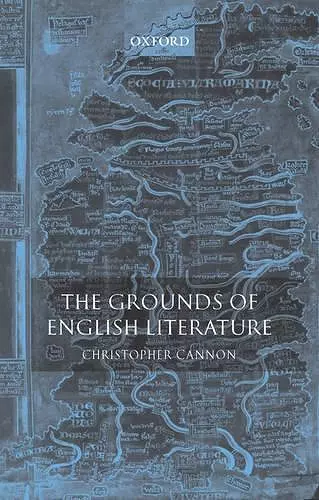The Grounds of English Literature
Format:Paperback
Publisher:Oxford University Press
Published:29th Nov '07
Currently unavailable, and unfortunately no date known when it will be back
This paperback is available in another edition too:
- Hardback£137.50(9780199270828)

The centuries just after the Norman Conquest are the forgotten period of English literary history. In fact, the years 1066-1300 witnessed an unparalleled ingenuity in the creation of written forms, for this was a time when almost every writer was unaware of the existence of other English writing. In a series of detailed readings of the more important early Middle English works, Cannon shows how the many and varied texts of the period laid the foundations for the project of English literature. This richness is for the first time given credit in these readings by means of an innovative theory of literary form that accepts every written shape as itself a unique contribution to the history of ideas. This theory also suggests that the impoverished understanding of literature we now commonly employ is itself a legacy of this early period, an attribute of the single form we have learned to call 'romance'. A number of reading methods have lately taught us to be more generous in our understandings of what literature might be, but this book shows us that the very variety we now strive to embrace anew actually formed the grounds of English literature-a richness we only lost when we forgot how to recognize it.
Review from previous edition This extraordinary book will have a transformative impact on the study of Middle English literary production in the centuries following the Norman Conquest. Its greatness lies in the sophistication and brilliance with which it generates entirely new questions - in a sense an entirely new field - out of a written milieu the author defines as the very "grounds of English literature", allowing the formal proclivities of the artefacts he examines to generate the theoretical, formalist, and historical lines of enquiry the book itself pursues. This is surely one of the most significant and groundbreaking books ever written on pre-Ricardian English literature. * Bruce W. Holsinger, Associate Professor, University of Colorado at Boulder *
Christopher Cannon's The Grounds of English Literature deals with the neglected texts of early Middle English literature in a straightforward, and also in a more subtle, sense. Most straightforwardly, it considers these early texts as a cluster of provisional points of departure for subsequent English literature. More subtly, it discovers a way of reading these texts as 'lone' objects, which are nevertheless 'grounded' in and by their material circumstances. Cannon develops this latter emphasis with notable originality. This is a splendid work, vividly couched in keen, and often elegant, prose. * Paul Strohm, William B. Ransford Professor of Medieval Literature, Columbia University *
No one working actively in Middle English studies knows as much about this period as Christopher Cannon. The Grounds of English Literature has all the virtues of his previous work: an intense engagement with the details of vocabulary, genre, and literary form; an aspiration to locate the analysis of those details in a broad theoretical framework; and a sensitivity to the ways in which the reception histories of medieval literary works (through editing, teaching, and criticism) have shaped our understanding of their meaning and canonicity. * Seth Lerer, Professor of English and Comparative Literature, Stanford University *
Cannon's own readings are intellectually intense, bracing, and rich in their associations ... swaggeringly brilliant ... Cannon's book is an exciting and virtuoso performance. It is heartening, even at times breathtaking, to see such momentous conclusions come out of Early Middle English * David Lawton, Wahsington University in St. Louis *
A theoretically engaged critical monograph ... Christopher Cannon's closely packed book deserves a wide readership * Nicholas Perkins, Times Literary Supplement *
ISBN: 9780199230396
Dimensions: 215mm x 137mm x 15mm
Weight: 323g
250 pages